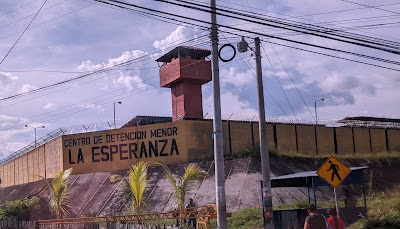In El Salvador, the State of Exception imprisons environmental activists
El Salvador has lived for a year and a half under the State of Exception. The State of Exception suspends the constitutional due process protections against arbitrary capture and detention, and allows people to be thrown into prison for months on the slimmest of allegations. An anonymous phone tip can be sufficient to have someone captured. The "exceptional measures," which are touted by the Bukele regime for their impact in reducing gang-related crime in the country, have been used in some cases, say advocates, to silence and threaten activists and community leaders who protest development projects of friends of the Bukele regime.
Carolina Amaya is a journalist who focuses on environmental issues in El Salvador. She has published important articles about challenges to the environment at her site MalaYerba. Two days ago she wrote a much more personal column in El Faro about the arrest of her father, Benjamin Amaya, a veteran of the Salvadoran armed forces and campesino farmer, who has been arrested under the State of Exception and disappeared into the country's prisons. She writes:
Neither my dad nor the other veterans have any gang ties. I know this because he has told me since 2021 how companies have wanted to take over their lands to build a solar energy plant. I know this because I have interviewed the farmers evicted from the farm "Argentina" and they verified for me that the campesino organization was getting organized. I know this because I live in El Salvador, a country where, for the past 16 months, being organized is a reason to end up in prison.
However, they were prosecuted and portrayed in public as gang members, when the only thing they have done for more than two years is defend the public lands where they live and farm, authorized by ISTA. The case, like that of many others during the [State of Exception], was classified as under seal, and if it had not been for the information from the lawyers who are accompanying me in the legal process, I would not know anything.
In her essay, Amaya goes on to detail the history of the powerful business interests attempting to dislodge her father and other veteran farmers from the lands where they raised subsistence crops. The moneyed groups included some of the founding donors of Bukele's Nuevas Ideas party. After a judge rejected charges that her father was associated with gangs, the system found new charges to keep her father locked up.
In describing the case of her father, Amaya points as well to the case of three community leaders arrested under the State of Exception who had been opposing construction of the "Airport of the Pacific," a signature project and campaign promise of Nayib Bukele.
Neighbors have denounced these captures, despite fear of reprisals. They assert that the arrests are due to the fact that the activists opposed the construction of the international Airport of the Pacific, a campaign promise by Bukele that is being carried out with irregularities and at the cost of leaving almost 700 peasants of Flor de Mangle and Condadillo without land or houses... The relatives of Óscar, José and Walter do not know anything about their situation, since the lack of a legal process is a pattern that is repeated in the captures committed under the exception regime. "In this case, there is not only a family-community impact, there is also an impact on the fight to defend the territories," says Ángel Flores, director of Milpa.
In another case from January of this year, El Salvador's government locked up five community organizers and environmental activists from the rural community of Santa Marta, alleging their participation in a decades old crime during El Salvador's civil war. But the circumstances surrounding the case suggest to many that the real motivation for their detention is to weaken resistance to metallic mining in the country and make possible the lifting of a mining prohibition. The UN Special Rapporteur for Human Rights Defenders expressed "We fear that the case is an attempt to intimidate those who seek to defend the environment in the country, and especially those who defend human rights from the negative impacts of mining" in a March 8 letter to the government of El Salvador. Read more about the serious doubts surrounding this case in my post from May.
Seven months later, on August 23, a court ordered that the Santa Marta activists be released from prison to house arrest, citing the deteriorating health of these older prisoners. Yet 10 days later, the prison system had failed to release the activists.
[Update: On Sept. 5, 2023 the Santa Marta leaders were finally returned home by authorities.]
These are compelling examples of how the State of Exception has locked up for months persons who have gotten in the way of powerful moneyed interests. These accounts illustrate that the State of Exception is not just a war on gangs, but is the elimination of any protections in the justice system for those who get in the way of the friends of those in power in El Salvador.
Here is Carolina Amaya telling the story in her own words:
Las investigaciones ambientales de @sharkgirl_sv incomodan a los mismos de siempre. Su padre, un líder campesino de 62 años, fue arrestado como pandillero por un conflicto con esos grandes intereses. Vean su historia:
— Nelson Rauda Zablah (@raudaz_) September 1, 2023
pic.twitter.com/REdXun1Aha

Comments